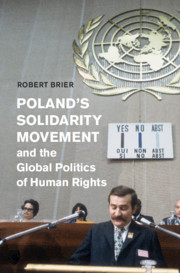Refine search
Actions for selected content:
3 results
10 - Human Rights and the End of the Cold War
-
- Book:
- Poland's Solidarity Movement and the Global Politics of Human Rights
- Published online:
- 28 May 2021
- Print publication:
- 10 June 2021, pp 200-216
-
- Chapter
- Export citation
Introduction
-
- Book:
- Poland's Solidarity Movement and the Global Politics of Human Rights
- Published online:
- 28 May 2021
- Print publication:
- 10 June 2021, pp 1-18
-
- Chapter
- Export citation

Poland's Solidarity Movement and the Global Politics of Human Rights
-
- Published online:
- 28 May 2021
- Print publication:
- 10 June 2021
